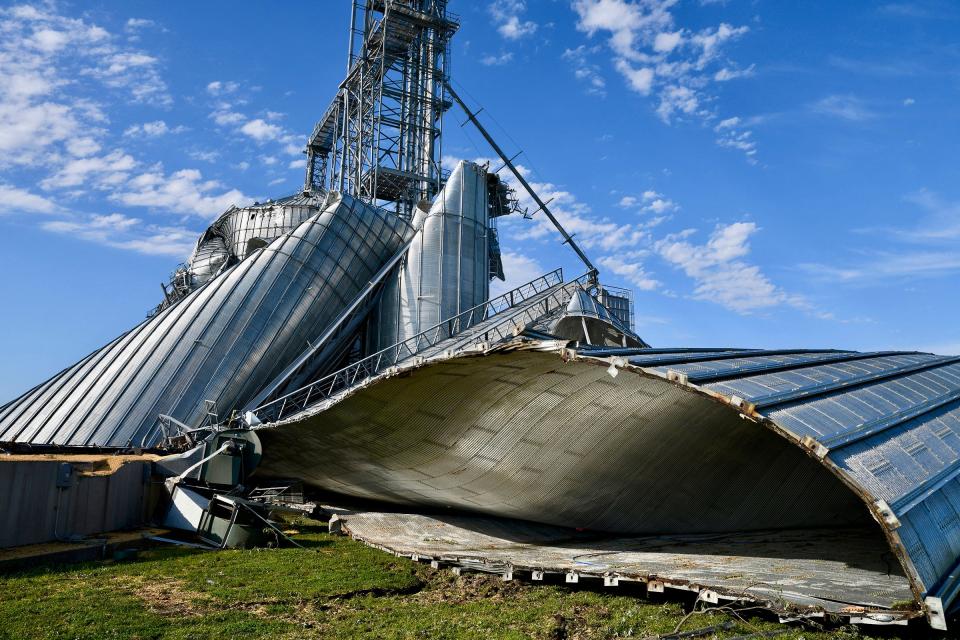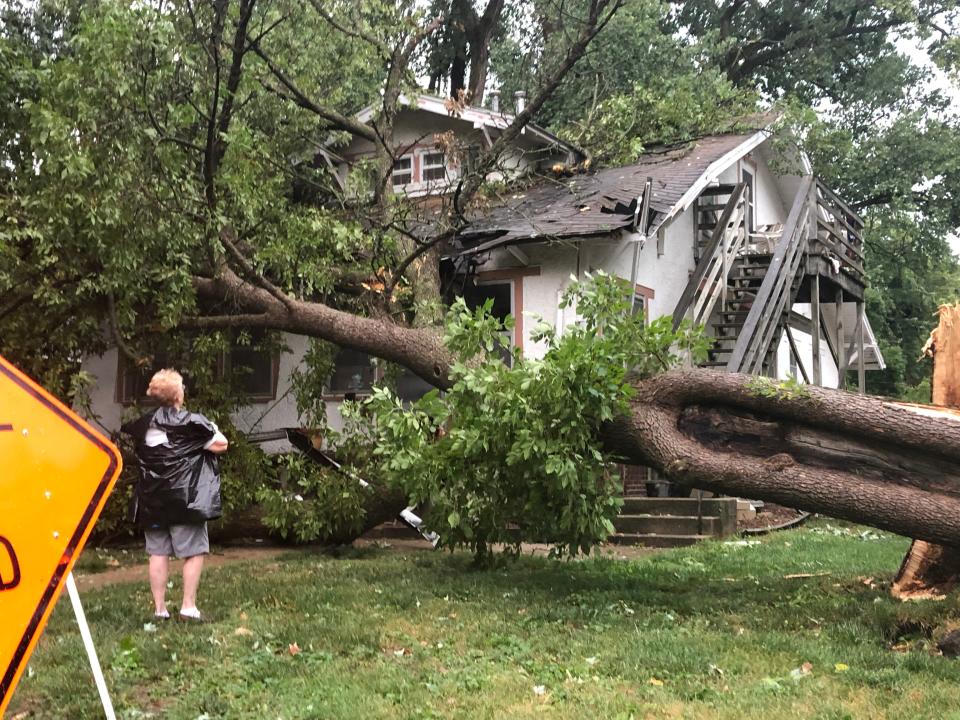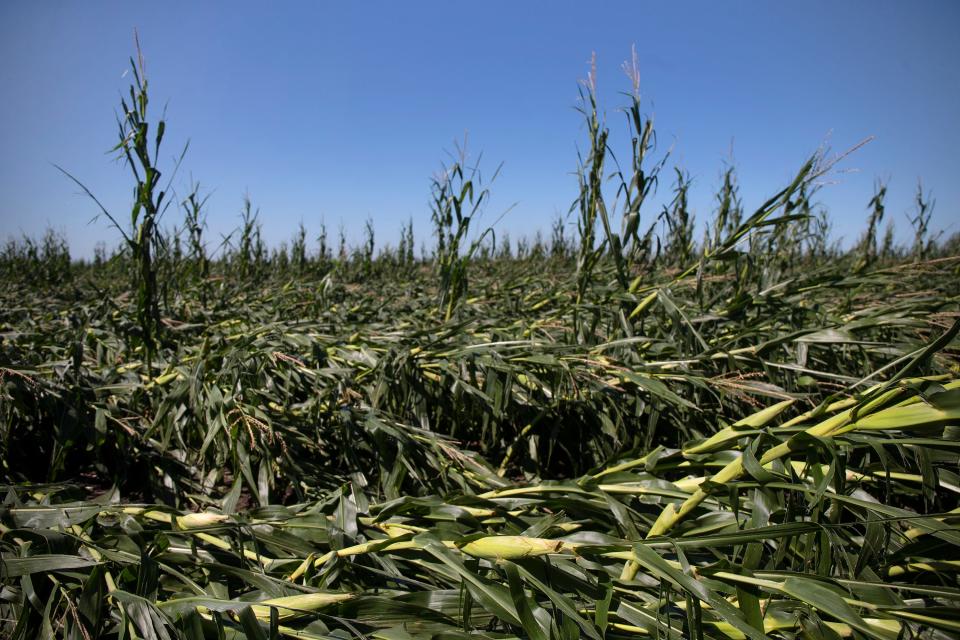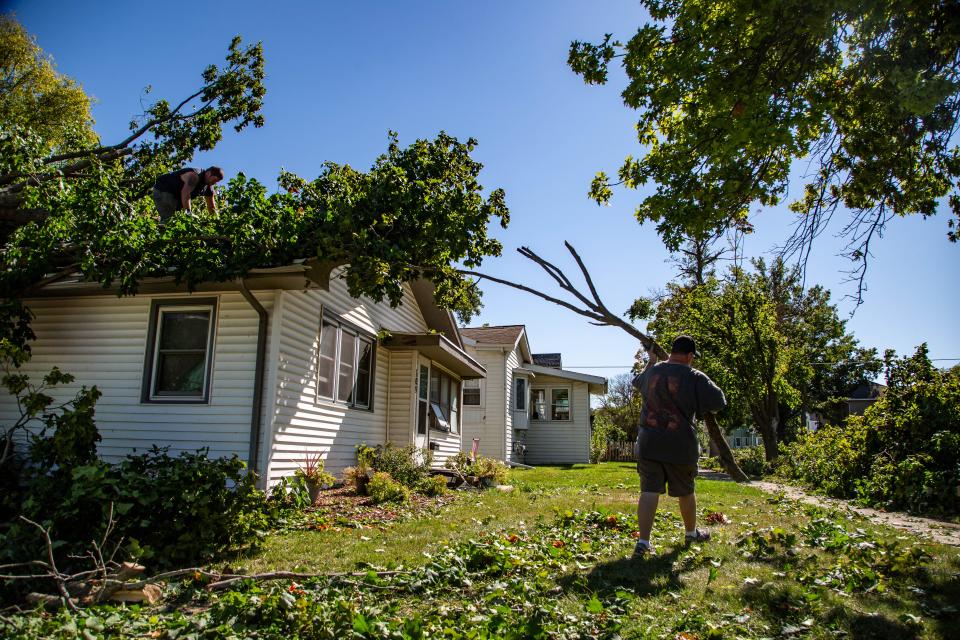Natural disasters threaten small insurers, leaving Iowans with high premiums and fewer choices
Large reinsurance firms are pulling out of Iowa after a string of natural disasters, jeopardizing coverage for the state's small-town farmers and residents.
Farmers Mutual Hail Insurance Co. told policyholders last week that the business will no longer reinsure county mutual insurance associations — small property and casualty firms that have covered Iowa's rural areas since the 1800s.
A Farmers Mutual spokesperson told the Des Moines Register in a statement the company will pull out of reinsurance because of a "significantly increased loss experience that is unsustainable."
Another firm, Grinnell Mutual, also confirmed to the Register it will no longer reinsure some companies. Reinsurance firms provide coverage to other insurers, assuming some of the risk and keeping the market stable.

Grinnell Mutual and Farmers Mutual sit in the middle of the property insurance market, and their recent decisions are early signs of a potential economic problem for Iowa, industry leaders said. While they both reinsure small-town county mutuals, Grinnell Mutual and Farmers Mutual in turn rely on reinsurance agreements with larger firms.
Farmers Mutual spokesperson Dave DeCapp blamed the company's recent decision on "capital scarcity in global reinsurance." The company needed to pay about $90.5 million to reinsurance policyholders in 2021, according to a report filed with the Iowa Insurance Division in May.
Grinnell Mutual spokesperson Jennifer Miller said in a statement that "the global reduction in reinsurance programs available to Grinnell Mutual" has led to "some mutuals not being offered reinsurance programs for 2024."
The company disclosed in its most recent annual report that it plans to raise rates for reinsurance customers by 40%.
More: Another company avoids risky Florida home insurance policies: Here's what caused the crisis
Both companies declined to say which reinsurance firms stopped covering their policies. The two companies also declined to say which Iowa companies are losing reinsurance as a result.
DeCapp said that Farmers Mutual is ending reinsurance agreements with eight Iowa county mutuals, while Grinnell Mutual declined to provide a number.
"FMH continues to research options that will allow it to continue supporting the county mutual industry," DeCapp said. "We have been in discussions with the Iowa Insurance Division to find palatable solutions given the current market challenges and will continue to do so."
An Iowa Insurance Division spokesperson did not return multiple calls or an email seeking comment.
'Iowa has become the Florida of the Midwest,' threatening small-town insurance businesses
Some industry experts said the news is an early sign of looming problems, particularly for small-town Iowans who will see large premium hikes or who could lose their current property insurer.
In addition to blaming the global reinsurance market, DeCapp said Farmers Mutual will exit that line of business because of increased interest rates, increased cost for building materials and "unprecedented weather events."
The company, best known for its crop insurance, also announced in May it will exit the property and casualty line.

The decisions come three years after the August 2020 derecho that caused $7.5 billion in damage, the costliest thunderstorm in U.S. history. The storm crossed central and eastern Iowa with winds at 140 mph and led to $1.6 billion in insurance claims, Iowa Insurance Division Consumer Advocacy Officer Sonya Sellmeyer wrote in a recent newsletter.
A second derecho ripped through the western part of the state 16 months later, the first December derecho on record. That storm spurred 43 tornadoes — the most in a single day in Iowa history.
The storms caused reinsurance firms to pay some county mutuals in impacted areas. They also caused providers to become more cautious of the Midwest, an area that industry leaders once saw as safer than the hurricane- and earthquake-vulnerable coastal states.
In California, State Farm and All State announced in recent months that they will no longer offer property and casualty insurance to new customers.
In Florida, Farmers Insurance announced in July it will stop writing new business and decline to renew its automobile, property and umbrella coverage.
"Iowa has become the Florida of the Midwest," said Tom O'Meara, executive director of the Independent Insurance Agents of Iowa.
For county mutuals in Iowa, losing reinsurance coverage jeopardizes their ability to operate. Iowa code requires these companies to maintain "reinsurance sufficient to protect the financial stability of the county mutual insurance association."

In his statement about Farmers Mutual's exit from reinsurance, DeCapp also blamed "regulatory challenges." DeCapp did not elaborate, but O'Meara said reinsurance firms will leave because Iowa does not cap how much money the companies pay for single events.
He said Iowa is one of three states without a cap.
O'Meara added that creating a limit will be difficult — particularly with the time crunch that county mutuals face. Grinnell Mutual and Farmers Mutual are dropping coverage for some county mutuals at the end of the year.
O'Meara said the Legislature needs to pass a law to create a payout cap, and lawmakers don't return to the Capitol until next year.
"It’s not like the (Iowa Insurance Division) can really act on this without legislative approval," O'Meara said. "We’re talking — what? — mid-January before the session starts again."
Iowa insurance leader: 'A hardship' looms for small-town customers
Miller, the Grinnell Mutual spokesperson, said the company will continue to sell reinsurance to "the vast majority of our customers." But those customers don't know what price they will pay — and how much more money they will charge their policyholders.
Nationally, the insurance brokerage firm Aon wrote in a recent note that reinsurance renewal rates for U.S. property and catastrophe policies increased 25% to 35% in July, according to Reuters.
In its most recent annual report, Grinnell Mutual wrote that reinsurers want companies to increase rates, increase deductibles that customers need to pay and decrease the amount of customers they cover.
"Members’ policy retentions will decline as rates increase, which will be welcome for less-capitalized companies," Grinnell Mutual wrote.
The company said its reinsurance division raised rates on clients like county mutuals by an average of 20% this year.
Grinnell Mutual expects to raise those rates at "double that level" for 2024 coverage. The company reported $236 million in underwriting losses between 2020 and 2022.
"We are all experiencing a global reinsurance market that is more challenging than the industry has seenin over 30 years, and this market cycle will expose weak companies and reward well-operated and well-capitalized ones," the company wrote in the report.

Adair County Mutual Insurance Association Secretary-Manager Marcia Kralik said her company holds a reinsurance agreement with Grinnell Mutual. She said the reinsurer has communicated frequently with county mutual leaders like her over the last year, "encouraging us to be proactive in our procedures."
According to financial reports filed with the insurance division, Adair County Mutual covers about 1,200 policyholders. The reinsurer ceded about $3 million in losses to Adair County Mutual from 2020 through last year.
"The market has changed so dramatically," Kralik said. "… That's going to mean a lot of adjustments to our customers. That's a hardship."
Kralik and Chris Ristau, president of First Maxfield Mutual Insurance Association, said Grinnell Mutual has told them they will provide estimates of increased reinsurance costs in October or November. Grinnell Mutual will negotiate with their own reinsurance providers until then, they said.
Ristau, whose company is based in Denver, a small town north of Waterloo, said increasing premiums for First Maxfield's customers "would be the obvious scenario" if Grinnell Mutual raises its rates. First Maxfield, which has about 10,000 policyholders, recorded about $567,000 in receivables from reinsurance companies in annual reports from 2020 to 2022.
Ristau said the December 2021 derecho creates future problems in Iowa. He believes bigger companies will set rates based on an assumption that the hurricane-like storms can hit at any time.
Firms used to believe that derechos only haunted the Midwest from April through August.
"The property and casualty climate in Iowa right now is bad, has been the last five years and will continue to be," Ristau said.
Tyler Jett is an investigative reporter for the Des Moines Register. Reach him at tjett@registermedia.com, 515-284-8215, or on Twitter at @LetsJett. He also accepts encrypted messages at tjett@proton.me.
This article originally appeared on Des Moines Register: Iowa rural insurers threatened by recent derechos as big firms leave

